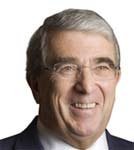|
The UK-Based Cadbury Schweppes has justified its rejection of the unsolicited takeover offer from Kraft Foods saying on Saturday that its rival's low-growth, conglomerate business model was unappealingas it differs from Cadbury's strategy of being a pure play confectionery company.  In a letter to Kraft chief executive officer, Irene Rosenfeld and posted on the company's web site on Saturday, Roger Carr, who chairs the world's second- biggest confectionery company as well as the UK energy giant Centrica, said that Kraft's $16.7-billion unsolicited takeover offer, ''fundamentally fails to reflect the current value of Cadbury as a standalone business.'' In a letter to Kraft chief executive officer, Irene Rosenfeld and posted on the company's web site on Saturday, Roger Carr, who chairs the world's second- biggest confectionery company as well as the UK energy giant Centrica, said that Kraft's $16.7-billion unsolicited takeover offer, ''fundamentally fails to reflect the current value of Cadbury as a standalone business.''
Kraft Foods, the largest food and beverage company in the US and the second largest in the world after Nestlé, said on 7 August that the UK confectioner Cadbury had rejected its $16.7-billion (£10.2 billion) acquisition offer to create ''a global powerhouse in snacks, confectionery and quick meals.'' (See: Cadbury rejects Kraft Foods' $16.7 billion merger offer) On 7 September, Kraft officially wrote a letter to the Cadbury board and took its unsolicited takeover proposal public in order to ramp up pressure on the UK confectioner by trting to get support from Cadbury shareholders, after the UK confectioner's board remained silent following a 28 August meeting held at Centica's office in London, where Rosenfeld had outlined the takeover proposal to Carr. Even though the Kraft proposal was made public on Labour Day - a holiday in the US - it triggered fierce debate across all corporate boardrooms in the UK and sent the London-based FTSE 100 soaring to its highest level ever in 2009, with Cadbury shares jumping 38 per cent to 783 pence against the 745 pence bid offer from Kraft. The Cadbury board was both rattled and furious with Kraft for going public with the news of its offer, since they were still talking to their advisors and its chief executive, Todd Stitzer, was discussing Kraft's bid at investor meetings in the US with 40 of Cadbury's top American shareholders. Sharply rebuking Kraft's proposal, Carr said, ''I also re-affirmed the board's confidence in our future prospects as an independent company. There is nothing in your letter dated 7 September, or your various announcements on and since that date, to change our view. The acquisition of chewing-gum maker, Adams in 2003 for $4.2 billion, had made Cadbury the world's biggest confectionery company until it dropped to the second spot when Mars acquired Wm Wrigley in 2008 for $22.6 billion. The London-based Cadbury had also acquired Turkish chewing gum maker Intergum in 2007 for $227 million and also taken a majority stake in Japanese candy maker Sansei Foods in the same year for $111 million. Carr said that with the acquisition of Adams, Intergum and Sansei, and the sale of its beverage business in Australia, the company had completed a major corporate transformation and created a pure play confectionery giant with strong brands with leading market positions in both developed markets and the high-growth emerging economies. But the real fight will emerge when the American Todd Stitzer, the first foreigner since Cadbury inception 185-year history, will be pitted against fellow American, Irene Rosenfeld, who are both scheduled to make speeches this week. Stitzer is scheduled to addresses investors on 16 September at a Sanford Bernstein analyst conference in London, while Rosenfeld will be addressing the University of Toronto's Rotman School of Management in Canada tonight. Stitzer, the Harvard and Columbia educated M&A lawyer, gave an insight of what his strategy would be to counter Kraft, when he told Times Online in an interview on Saturday, ''We don't need any more products to grow, we are in half of the world's 50 largest confectionery markets and we are No 1 or 2. We are big in Argentina, Colombia, Brazil and Venezuela, but there is white space in Chile and Peru.''
Kraft, however, is left with very little room to manoeuvre, since raising its 745-pence bid, risks being downgraded by all the three major rating agencies, which have already put the company on review for a downgrade. But Kraft is part relying on the muscle power of its public relations company and advisors it has hired to make the deal go through. Earleir the same firm, had been hired by InBev in its hold-no-bars takeover of Anheuser-Busch last year. Analysts say that Carr's letter was intended to tell Kraft that it would have to raise its bid; Carr ended his letter to his letter to Rosenfeld saying, ''Finally, I would emphasise that the delivery of value to our shareholders remains at the top of our agenda…..your proposal fundamentally fails to reflect the current value of Cadbury as a standalone business, its growth prospects and the potential synergies of a combined entity.''
|